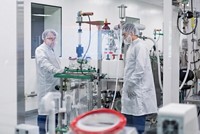Advertisement
Grab your lab coat. Let's get started
Welcome!
Welcome!
Create an account below to get 6 C&EN articles per month, receive newsletters and more - all free.
It seems this is your first time logging in online. Please enter the following information to continue.
As an ACS member you automatically get access to this site. All we need is few more details to create your reading experience.
Not you? Sign in with a different account.
Not you? Sign in with a different account.
ERROR 1
ERROR 1
ERROR 2
ERROR 2
ERROR 2
ERROR 2
ERROR 2
Password and Confirm password must match.
If you have an ACS member number, please enter it here so we can link this account to your membership. (optional)
ERROR 2
ACS values your privacy. By submitting your information, you are gaining access to C&EN and subscribing to our weekly newsletter. We use the information you provide to make your reading experience better, and we will never sell your data to third party members.
Generics
Covid-19
White House tackles persistent supply chain vulnerabilities
Biden’s focus on reshoring drug production carries forward the Trump administration’s pandemic response
by Rick Mullin
June 9, 2021
| A version of this story appeared in
Volume 99, Issue 22

The Biden-Harris administration released key findings of a review of vulnerabilities to critical US supply chains. The findings include an outline of immediate actions that the government will take in order to secure supplies to key sectors of the economy, among them pharmaceuticals and active pharmaceutical ingredients (APIs).
Support nonprofit science journalism
C&EN has made this story and all of its coverage of the coronavirus epidemic freely available during the outbreak to keep the public informed. To support us:
Donate Join Subscribe
The review, mandated by an executive order issued days after President Joe Biden’s inauguration, also lists accomplishments in meeting steep supply challenges, including a rapid expansion of manufacturing for vaccines and other medical supplies by the federal COVID-19 Response Team.
The supply chain in pharmaceuticals remains highly vulnerable as a result of years of outsourcing to low-cost producers, especially in China and India, according to the report. “China and India are estimated to control substantial parts of the supply chain where there have been issues with shortages due to a range of disruptions that have impacted supply as well as quality and safety,” says a fact sheet on the report issued by the White House. For example, generic drugs fill about 90% of prescription medicines in the US, and about 87% of API facilities for such medicines are located outside the US. “The drive toward lower costs as well as unfair trade practices have led to a hollowing out of domestic production. A new approach is needed to ensure more resilient supply chains that includes improving transparency, building emergency capacity, and investing in domestic production,” the fact sheet says.
As part of its response to pharmaceutical supply chain vulnerability, the administration says the US Department of Health and Human Services (HHS) will establish a public-private consortium for manufacturing essential medicines. The consortium will begin by selecting 50–100 drugs from the US Food and Drug Administration’s essential medicines list as priorities to reshore production.
The HHS will also initially commit about $60 million to develop technologies that will aid domestic manufacturing of active pharmaceutical ingredients.
The proposals reflect and continue the Donald J. Trump administration’s effort to secure the pharmaceutical supply chain in response to the COVID-19 pandemic. In addition to laying the groundwork for vaccine production, the Trump administration marshaled federal investment aimed at reshoring the manufacture of key pharmaceutical products. Phlow, a partnership formed last year to put continuous flow manufacturing technology to work producing key APIs at a plant in Virginia, received a $354 million grant from the HHS’s Biomedical Advanced Research and Development Authority (BARDA).
Martin VanTrieste, CEO of Civica Rx, which works to secure supply of medicines for healthcare clients and is one of the partners in Phlow, applauds the report, characterizing the Biden program as building upon and bolstering the previous administration’s program. “It’s really encouraging that both administrations recognize the vulnerability of the pharmaceutical supply chain and understand we have to have supply chain resilience,” he says. “And it’s good to note that the current administration recognizes that the drug shortage situation and supply chain vulnerability will be there after the pandemic,” he says.
However, VanTrieste says, although the report faults just-in-time inventory management for supply disruptions during demand surges early in the pandemic , it does not recommend incentives to assist manufacturers in managing increased inventories.
Industry consultant Peter Bigelow, president of xCell Strategic Consulting, also likes the administration’s program for reshoring manufacture of drugs and APIs. “The aggressive pursuit of lower cost drugs is what led to the move of production to low cost countries,” he told C&EN in an e-mail response to queries. “The current buying model in the US will continue to drive that result unless the model changes. The fact that this document acknowledges that fact is a start.”
In addition to pharmaceuticals, the report addresses supply chain issues in advanced packaging, large capacity batteries, and critical minerals and materials. It states that China has captured a large portion of the supply chain for minerals and materials essential to meeting the increased demand for clean energy technology, making US producers dependent on state-funded refining operations in China. The report cites the need for investment in sustainable production, refining, and recycling that meets environmental standards as well as environmental justice criteria.
Correction
This story was updated on June 10, 2021, to correct the caption. Construction began on Civica Rx's facility in Petersburg, Virginia, earlier this year, not last year.
This story was updated on June 11, 2021, to correct the caption. Although work on Civica Rx's actual building in Petersburg, Virginia, began earlier this year, construction in preparation of the building began last year.




Join the conversation
Contact the reporter
Submit a Letter to the Editor for publication
Engage with us on Twitter